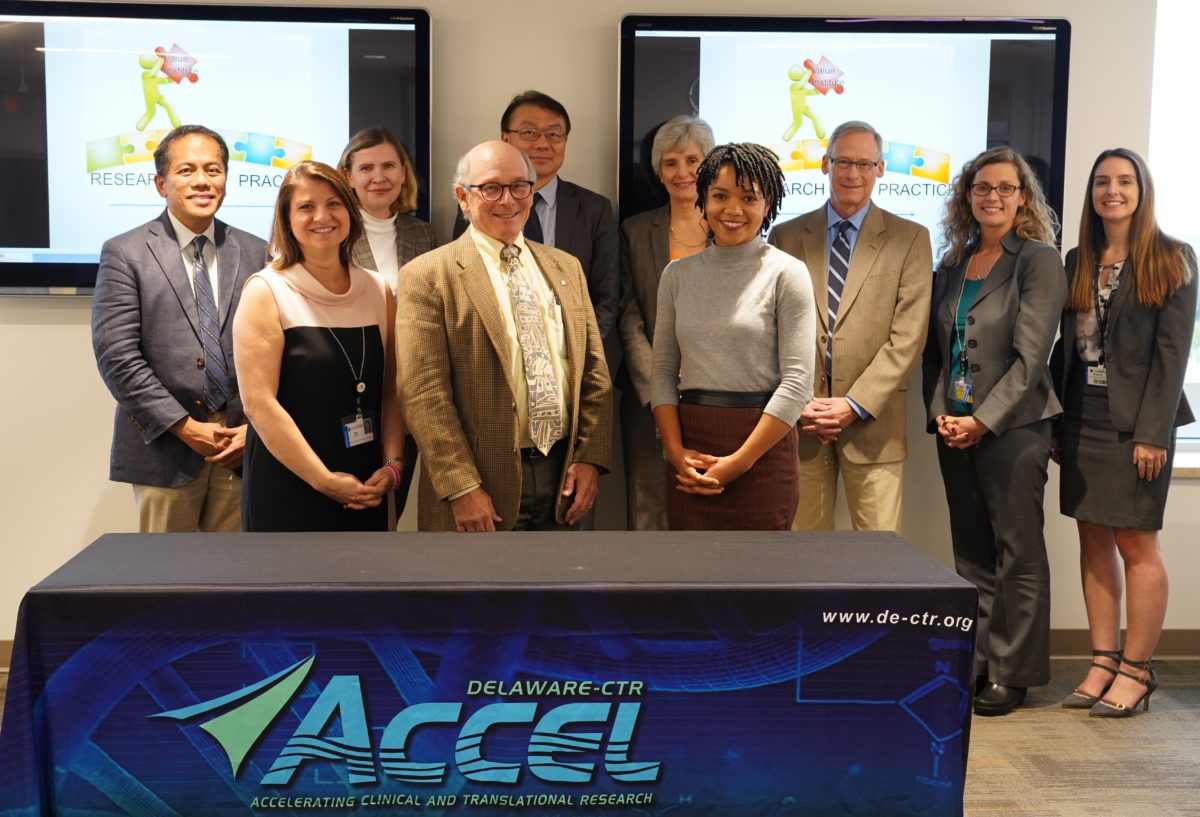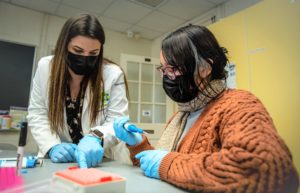Christiana Care Health System and four partners will share a five-year, $25 million grant renewal to support research advancing medical science and transforming health care delivery.
Since 2013, Christiana Care has been part of Delaware’s Center for Translational Research ACCEL Program, a collaborative of the state’s public research institutions led by the University of Delaware. The recent grant award, funded at $20 million from the National Institutes of Health and $5 million from the state of Delaware, will continue that collaborative through 2023.
ACCEL stands for “accelerating clinical and translational research.”
“Growing clinical and translational research in Delaware harmonizes with our mission and vision, which includes a commitment to be curious, seek new knowledge and anticipate the needs of our neighbors,” said Ken Silverstein, M.D., MBA, Christiana Care’s chief clinical officer. “Our research has a laser focus on improving health outcomes, and ACCEL helps us take our results from the bench to both the bedside and the community.”
As part of the renewal, a group of NIH research leaders visited Christiana Care’s Value Institute to learn more about the accomplishments and lessons learned by Christiana Care during ACCEL’s first five years. The NIH leaders also learned what Christiana Care aspires to accomplish during the next five years.
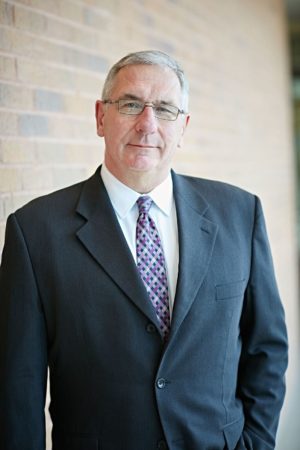
As an example of how ACCEL supports research at Christiana Care, Eric Kmiec, Ph.D., director of the Gene Editing Institute of the Helen F. Graham Cancer Center & Research Institute, spoke about the need to pair genetic research with expertise on behavior and community outreach.
“You can’t understand how to treat a disease without understanding the world outside your lab,” Dr. Kmiec said. “I don’t know if we’d have gotten there if it weren’t for this program.”
ACCEL functions like a scaffolding upon which its members — Christiana Care, the University of Delaware, Nemours/Alfred I. duPont Hospital for Children, the Medical University of South Carolina and, as a new member, Delaware State University (DSU) — can collaborate, attract talent and develop meaningful research that directly impacts population health.
ACCEL can provide pilot funds to get ideas off the ground and help in other ways, including the provision of epidemiologic and statistical analysis and connecting research to the community.
ACCELerating research
The ACCEL grant is funded through the NIH’s Institutional Development Award, or IDeA, program, which aims to enhance research in states that, like Delaware, have had historically low levels of funding.
Stuart Binder-Macleod, Ph.D., PT, FAPTA, Edward L. Ratledge Professor and Associate Deputy Provost for Clinical and Translational Research at the University of Delaware, is ACCEL’s principal investigator.
The ACCEL program has three key goals:
- Develop infrastructure to facilitate clinical and translational research in Delaware and South Carolina.
- Recruit, train and develop professionals who can develop outstanding research.
- Engage the community to promote health and wellness to a diverse population.
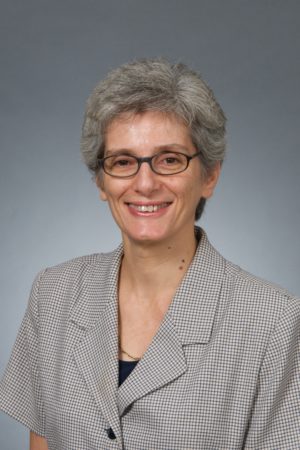
Over the past five years, ACCEL has distributed $5.1 million in grants, and its awardees have gone on to earn $31.6 million in external grants.
ACCEL’s support to researchers is more than financial. Claudine Jurkovitz, M.D., MPH, a senior physician scientist at Christiana Care’s Value Institute, leads the Biostatistics, Epidemiology and Research Design Core, which offers free consults to ACCEL members. These consults have contributed to 134 publications and 15 peer-reviewed grants.
They have also held 118 seminars viewed by 4,000 people in person and online.
Listening to community health priorities
Though the number of external grants and new collaborations among members are important metrics for ACCEL, it also has a mandate to improve health outcomes for Delawareans. And research has a central role in the continuous improvement of medicine, said LeRoi S. Hicks, M.D., MPH, FACP, physician leader of the Value Institute.
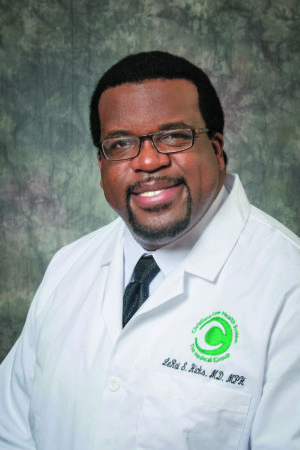
Using cardiovascular events as an example, Dr. Hicks noted how, even over the span of his career, first-line treatment protocols have been utterly rewritten by advances in research.
Heather Bittner Fagan, M.D., MPH, associate vice chair for research at Christiana Care’s Department of Family and Community Medicine, said there need not be compromise between effective research and community values.
“We make good science better, more impactful,” said Dr. Bittner Fagan, also the ACCEL lead for community engagement and outreach. “At its heart, any research should have in mind the people whose health it seeks to improve, and involving those people in how you ask questions makes the results more practical and applicable to their lives.”
The first five years of the grant showed that the community’s research priorities — mental health, substance use disorder and social determinants of health round out the top three — don’t always align with those of clinicians. The addition of Delaware State University, a historically black public university in Dover, to the collaborative is expected to bring new expertise in community outreach.
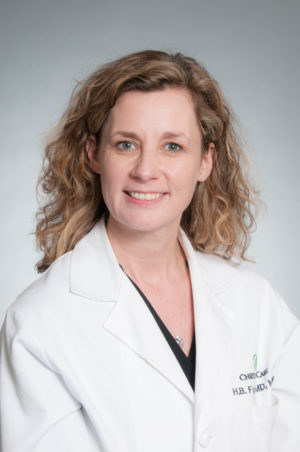
Its location in Kent County will help the collaborative reach further across Delaware.
“Our partnership with DSU gives us the opportunity to diversify our workforce of researchers,” Dr. Bittner Fagan said. “By attracting more researchers from traditionally underrepresented communities, we will be able to conduct more useful and insightful research that ultimately will help improve the health of our neighbors.”
During the visit by NIH officials, Dominique Medaglio, Pharm.D., MS, a senior clinical researcher at the Value Institute, presented her work on medication adherence.
Though most existing research focuses on whether patients take their medication, she used pharmacy claims data to investigate how many patients were filling their prescriptions in the first place.
She found 39 percent of people discharged after a cardiovascular event did not fill at least one of their discharge prescriptions and about 10 percent didn’t fill any.

Over the next five years, ACCEL’s major goals include gaining insight from large data sets through the development of a Medicare data analysis center, finding new ways to share data between institutions and mentoring clinical researchers to help them find success, said Value Institute Corporate Director Mia Papas, Ph.D., M.S., the site principal investigator for ACCEL.
“We are looking forward to more funded research projects, more connections across ACCEL institutions and, most importantly, improved health outcomes for the community,” she said.
